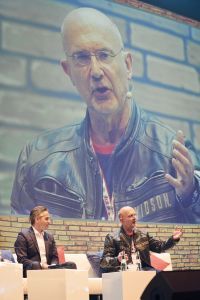NTT DATA Business Solutions founder Herbert Vogel would rather look ahead than back. However, he made an exception for us. He talked to us about major milestones, prominent companions on his journey, and his wishes for the future.
Herbert Vogel: The Corporate Culture Is Crucial

 Mr. Vogel, at the beginning of your career, you worked for two long-established and prestigious German companies – Blaupunkt und Bertelsmann. Did you have an inkling back then that you wanted to become an entrepreneur yourself?
Mr. Vogel, at the beginning of your career, you worked for two long-established and prestigious German companies – Blaupunkt und Bertelsmann. Did you have an inkling back then that you wanted to become an entrepreneur yourself?
No. But I did experience two totally different corporate cultures back in those days. I benefited from this later on as entrepreneur.
What were the differences?
At the time, Blaupunkt had just lost its most important customer, and was enveloped in a major crisis. Morale was low, the atmosphere was unpleasant – in short, it wasn’t a fun place to work. The situation at Bertelsmann was completely different. The company was thriving, and employees were shown respect and appreciation. Reinhard Mohn in particular epitomized this. I modeled myself on him later on.
At Bertelsmann, you rose from programmer to head of department in the eighties, handling projects such as the introduction of SAP. So why did you choose to go it alone?
At some point, I had a new boss I didn’t really get on with. In addition, my future business partner Wolfgang Schmidt suggested that we form a small IT consulting firm together. But I was skeptical at first, as I had just become a father and had a family to support.
Some two years later, you relented, and in 1989 you both set up the IT consulting firm S&P Consult, which later became NTT DATA Business Solutions AG. Did you already have the ambition to build up a big company back then?
No. Our first target was to have 10 employees. Then we kept on growing and set new targets.
Intensive Discussions with Dietmar Hopp
When you look back at the initial phase, what factors were particularly important to the company’s growth?
One of them was definitely our strong contacts with Bielefeld University, through which we recruited some outstanding mathematicians, in line with the maxim “always try to hire people who are better than you”. We also managed to retain these people, mainly because of the corporate culture. I placed great emphasis on a collaborative leadership style and always tried to be approachable.
The upward trajectory continued throughout the nineties. What would you say were the key milestones?
After just a few years, we focused almost entirely on SAP consulting, and in the mid-nineties, we held intensive discussions with SAP co-founder and then CEO Dietmar Hopp. That was the basis for our excellent close relationship with SAP.
How did you convince Dietmar Hopp?
You’d have to ask him. But one thing is clear: he saw us as the paradigm of an SAP consulting firm in the SME segment, and treated us on a par with IBM, HP and other major consultancies. After that, we decided to focus fully on SMEs and stop supporting big companies. In our situation at the time, that was a significant change of direction.
When did the company start to expand outside Germany?
That was also in the mid-nineties – looking back, that was a really important phase. We opened our first branch in 1995 in the United States, which remains the most important foreign market for NTT DATA Business Solutions. Branching out abroad eventually proved to be a vital step: without the strong US business, we probably wouldn’t have survived our severe crisis at the start of the new millennium.
My Biggest Business Mistake
What happened?
In 2000, we decided to merge with APCON AG, a Hamburg-based software firm. That was my biggest business mistake, and took us to the brink of disaster. It soon transpired that APCON was worth far less than we had been led to believe. We failed to do proper due diligence beforehand, and really got our fingers burned.
How did you turn things around?
I put my nose to the grindstone for two years, in some cases working round the clock. We gradually parted company with all APCON managers and constantly had to cope with tricky situations where money was tight. Without the income from the USA and Switzerland, I would probably have had to file for insolvency at some point. Looking back, this was a defining phase; it certainly taught me a lesson in humility.
After the APCON episode, you turned all your attentions back to SAP consulting, and starting in 2004, there were several strong years of constant growth. Why did you decide to get NTT DATA on board as an investor and owner?
I was and I still am convinced that NTT DATA is the ideal partner for long-term growth. And I wanted to lay the foundations early on for the company to grow and move forwards independently of me as its founder.
You stepped down as CEO in 2016. How hard was it to do this?
Something like that doesn’t come easily. But it was the right time, especially as an outstanding successor was on hand in Norbert Rotter. And those who know me will know that there’s no chance of me getting bored.
You are a keen sailor. What else keeps you occupied?
I have a demanding position as Chairman of the Supervisory Board of NTT DATA Deutschland, an affiliate of NTT DATA Business Solutions. There are also other Supervisory Board and consultancy roles as well as voluntary commitments.
What are these commitments?
I am Chairman of the German handball league team TBV Lemgo and Managing Director of the Bielefeld Research and Innovation Campus (BRIC), an initiative involving the University, the University of Applied Sciences, the city council and the Chamber of Industry and Commerce. Our aim is to locate innovative start-ups right next to the universities and strengthen Bielefeld as a business location.
Where would you like to see NTT DATA Business Solutions in 30 years?
In fast-moving times like these, it’s particularly hard to look so far ahead. To me, NTT DATA Business Solutions is all about a clear focus on SAP and a first-class corporate culture. If the company continues to find and retain good people, I am really confident that it will maintain its upward trajectory.